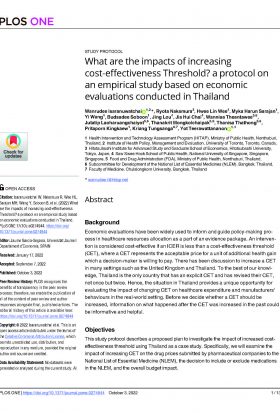This website uses cookies so that we can provide you with the best user experience possible. Cookie information is stored in your browser and performs functions such as recognising you when you return to our website and helping our team to understand which sections of the website you find most interesting and useful.
What are the impacts of increasing cost-effectiveness Threshold? a protocol on an empirical study based on economic evaluations conducted in Thailand

รายละเอียดเพิ่มเติม
Economic evaluations have been widely used to inform and guide policy-making process in healthcare resources allocation as a part of an evidence package. An intervention is considered cost-effective if an ICER is less than a cost-effectiveness threshold (CET), where a CET represents the acceptable price for a unit of additional health gain which a decision-maker is willing to pay. There has been discussion to increase a CET in many settings such as the United Kingdom and Thailand. To the best of our knowledge, Thailand is the only country that has an explicit CET and has revised their CET, not once but twice. Hence, the situation in Thailand provides a unique opportunity for evaluating the impact of changing CET on healthcare expenditure and manufacturers’ behaviours in the real-world setting. Before we decide whether a CET should be increased, information on what happened after the CET was increased in the past could be informative and helpful.
This study protocol describes a proposed plan to investigate the impact of increased costeffectiveness threshold using Thailand as a case study. Specifically, we will examine the impact of increasing CET on the drug prices submitted by pharmaceutical companies to the National List of Essential Medicine (NLEM), the decision to include or exclude medications in the NLEM, and the overall budget impact.
Learn more: https://journals.plos.org/plosone/article?id=10.1371/journal.pone.0274944




